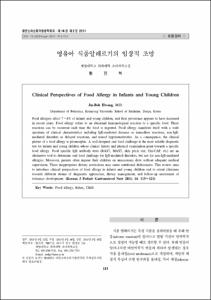영유아 식품알레르기의 임상적 조망
- Keimyung Author(s)
- Hwang, Jin Bok
- Department
- Dept. of Pediatrics (소아청소년학)
- Journal Title
- 대한소아소화기영양학회지
- Issued Date
- 2011
- Volume
- 14
- Issue
- 2
- Abstract
- Food allergies affect 7∼8% of infants and young children, and their prevalence appears to have increased in recent years. Food allergy refers to an abnormal immunological reaction to a specific food. These reactions can be recurrent each time the food is ingested. Food allergy manifests itself with a wide spectrum of clinical characteristics including IgE-mediated diseases as immediate reactions, non-IgEmediated disorders as delayed reactions, and mixed hypersensitivities. As a consequence, the clinical picture of a food allergy is pleomorphic. A well-designed oral food challenge is the most reliable diagnostic test for infants and young children whose clinical history and physical examination point towards a specific
food allergy. Food specific IgE antibody tests (RAST, MAST, skin prick test, Uni-CAP, etc) are an alternative tool to determine oral food challenge for IgE-mediated disorders, but not for non-IgE-mediated allergies. Moreover, parents often impose their children on unnecessary diets without adequate medical supervision. These inappropriate dietary restrictions may cause nutritional deficiencies. This review aims to introduce clinical perspectives of food allergy in infants and young children and to orient clinicians towards different strains of diagnostic approaches, dietary management, and follow-up assessment of tolerance development.
- Alternative Title
- Clinical Perspectives of Food Allergy in Infants and Young Children
- Keimyung Author(s)(Kor)
- 황진복
- Publisher
- School of Medicine
- Citation
- 황진복 and Jin-Bok Hwang. (2011). 영유아 식품알레르기의 임상적 조망. 대한소아소화기영양학회지, 14(2), 113–121. doi: 10.5223/kjpgn.2011.14.2.113
- Type
- Article
- ISSN
- 1229-0114
- Appears in Collections:
- 1. School of Medicine (의과대학) > Dept. of Pediatrics (소아청소년학)
- 파일 목록
-
-
Download
 oak-bbb-2292.pdf
기타 데이터 / 884.93 kB / Adobe PDF
oak-bbb-2292.pdf
기타 데이터 / 884.93 kB / Adobe PDF
-
Items in Repository are protected by copyright, with all rights reserved, unless otherwise indicated.